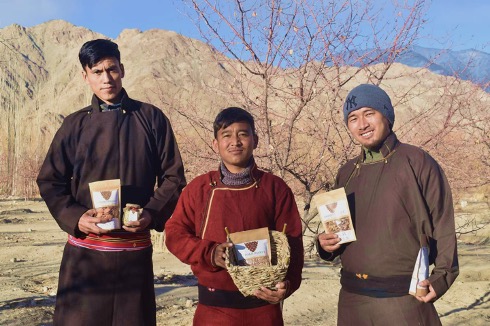A casual conversation with three elderly women would leave Thinles Norboo sleepless that night and set him on a mission to change the lives of people in rural Ladakh, in India.
As he and his friend chatted with the women outside a traditional flour mill, Norboo asked one of them about her family. “They went up to the hills to graze the sheep,” she replied.
It was a white lie.
The family had left her behind and departed for Leh - Ladakh’s capital city - in search of work.
That night Norboo tossed and turned wondering if he could do something for villagers, to ensure they could earn a decent living. He would come up with the idea of Ladakh Basket.
Nestled between the majestic Himalayas and the great Karakoram Mountain Range in Central Asia, Ladakh is filled with pristine lakes, snow-capped peaks, and azure blue skies.
The state’s natural splendour is matched by its rich culture.
People here cherish togetherness and exude kindness. They are proud of their unique history and traditions, and Norboo desired to celebrate and preserve this culture.
Despite its remoteness, Ladakh is not immune to the march of globalization. Here too, technology and science are having an impact.
Processed and mass-produced food is widely available in markets, and farmers in the region have taken to using fertilizers and pesticides. That easy access to processed food and growing income from tourism is driving people from villages to cities in search of jobs, causing them to abandon agricultural practices.
At the losing end are local artisans, farmers, and craftspeople who lack access to markets and platforms to sell their products and earn a decent income.
Norboo and his friends Stanzin Jorden and Sonam Stanzin founded Ladakh basket to market local Ladakhi produce to support the region’s farmers
Now, the venture that began in 2020 with 10 farmers from different villages sources and sells exotic and organic products from Ladakh, such as Halman apricots, chamomile tea, and roasted barley flour, a Ladakh specialty.
The business is growing with online orders coming in from across India and abroad.
“We were very skeptical about our idea initially but now we see the opportunity and the market is huge,” said Jorden, adding that they endured many phases of doubt and despair.
As the venture grows, they are encouraging villages to embrace organic farming. Last year, they adopted Liktsey village as an organic village and this year they plan to adopt Fulak village in the remote Rong area.
With the help of a local government agriculture expert, they have been raising awareness about organic farming. Norboo says the goal is to educate villagers about the benefits of organic farming, and the adverse consequences of chemical fertilizers and pesticides.
Norboo credits Youth Co:Lab’s Regional Dialogue on Indigenous Youth Social Entrepreneurship & Innovation in 2020, which was aimed at indigenous young social entrepreneurs, for opening up “a world of opportunity” for Ladakh Basket.
“It was really encouraging for us to see that we were not alone, and we had all this support, ” he adds.
Besides UNDP support, volunteers from Citi Bank provided expertise and ideas on how best to market products and use social media. And an online UN Volunteer has helped redesign the website, making it more efficient and user friendly.
Like other businesses, Ladakh Basket too has not been immune to the challenges posed by COVID-19, and the team says it has taught them some invaluable lessons.
“COVID taught us that there will always be challenges and unforeseen circumstances, we have to be resilient, improvise and adapt to the new normal.”
They have used the down time to move into a new, bigger office, near Leh; introduced a payment gateway for online orders; invested in sustainable packaging; and continue to seek funding, to grow the venture. They are also working on getting their products certified to enhance their value.
The “basket” is crucial to Norboo’s objective of encouraging conservaton and recycling.
“For as long as we have known, the basket is the way we transported just about everything across villages, hills and mountain ranges. We even carry our babies in them. The basket specially made in Ladakh has been an economic lifeline – and so the name of our company,” explains Norboo.
Their baskets, made of dried chipkiang grass, commonly found all over Ladakh, are being produced by Tsultim Dolker, an artisan from the village of Tarchit. As a female basket weaver, she has broken the glass ceiling of gender roles and stereotypes, as traditionally baskets were always woven by men.
“Ladakh Basket is honoured to have her make our baskets”, says Norboo. “She is just one of many people, a growing army, that represents what we at Ladakh Basket are aiming to achieve: breaking barriers, driving sustainable development, preserving unique traditions, and making the world better for it.”
---------------------------------------------------------------------------------------------------------------
Co-led by UNDP and Citi Foundation, Youth Co:Lab establishes a common agenda for countries in Asia-Pacific to empower and invest in youth so that they can accelerate the implementation of the Sustainable Development Goals (SDGs) through leadership, social innovation and entrepreneurship. Read more about Youth Co:Lab here.

 Locations
Locations




